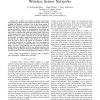Free Online Productivity Tools
i2Speak
i2Symbol
i2OCR
iTex2Img
iWeb2Print
iWeb2Shot
i2Type
iPdf2Split
iPdf2Merge
i2Bopomofo
i2Arabic
i2Style
i2Image
i2PDF
iLatex2Rtf
Sci2ools
123
click to vote
MASCOTS
2010
2010
Cluster-Based Correlated Data Gathering in Wireless Sensor Networks
—We consider the problem of optimal cluster-based data gathering in Wireless Sensor Networks (WSNs) when nearby readings are spatially correlated. Due to the dense nature of WSNs, data samples taken from nearby locations are statistically similar. We show how this data correlation can be exploited to reduce the amount of data to be transmitted in the network and thus conserve energy. While much attention in recent years has been paid to analyzing and optimizing cluster-based WSNs from various perspectives, the problem of energy-efficient clustering of WSNs in presence of data correlation is not yet fully explored. In this paper, we model a single-cluster network and analytically characterize the optimal cluster size subject to its distance from the sink as well as the degree of correlation. Contrary to existing approaches, our findings show that heterogeneoussized clusters, where the clusters further from the sink are larger, are more energy-efficient. We also propose a heuristic ...
Related Content
| Added | 29 Jan 2011 |
| Updated | 29 Jan 2011 |
| Type | Journal |
| Year | 2010 |
| Where | MASCOTS |
| Authors | Ali Dabirmoghaddam, Majid Ghaderi, Carey L. Williamson |
Comments (0)

